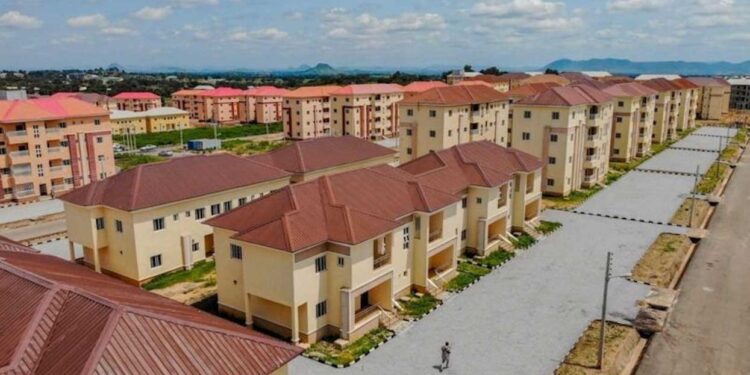Subsidy Removal Impact: Experts Predict Rising Building Material and Construction Costs
Examining the impact of the fuel subsidy removal on various aspects of society, including the
real estate market, experts in the sector are anticipating a rise in the cost of construction/ housing projects.
They foresee tough times for developers/ home builders, accommodation seekers, and tenants across the country.
Though they agreed that the removal of subsidy on petrol will allow the government to redirect funds towards pro-poor programs such as social welfare, education, healthcare, and infrastructure development.
Founder and chief executive, cromwell professional, Sola Enitan, believes that reallocating resources to these areas would allow the authorities to potentially address systemic inequalities and improve the overall well-being of the poor.
Looking at its impact on
real estate, Enitan said the removal of subsidy on petrol would have both direct and indirect effects on the sector.
He argued that the cost of transportation, including commuting and logistics would increase.
This, he said, would lead to higher operating costs for businesses for investors, affecting their bottom line and potentially reducing their ability to expand or invest in new
real estate ventures.
Additionally, he said that increased transportation costs could lead to reduced mobility and limited access to certain locations, impacting property values in those areas.
Besides, the real estate expert pointed out that higher fuel prices could contribute to overall inflation in the economy.
According to him, this might result in increased construction costs, including the cost of building materials and transportation, which might indirectly affect
real estate prices.
He added that developers and investors could face higher costs when constructing or renovating properties, potentially leading to higher property prices or slower development activity.
He said “The removal of fuel subsidies can influence consumer behavior and purchasing power. As fuel prices rise, individuals may adjust their preferences for property location, favoring areas closer to their workplaces or essential services to reduce transportation costs. “This shift in demand may lead to increased interest in urban areas or properties situated in close proximity to public transportation, potentially driving up prices in these locations.”
Enitan said the situation could create market volatility, explaining that changes in government policies such as the removal of fuel subsidy, could introduce uncertainty into the real estate market.
According to him, investors could become cautious and adopt a wait-and-see approach, leading to reduced activity and potentially impacting property prices.
Additionally, he stated that market volatility could affect the availability of financing options, making it harder for some individuals to access credit for
real estate purchases. Enitan said “It is important to note that the impact of removing fuel subsidies on the real estate market can vary depending on various factors such as the local economy, geographical location, and the effectiveness of other socioeconomic policies implemented alongside subsidy removal.
“Additionally, government interventions or supportive measures can help mitigate any adverse effects and ensure a smooth transition for both the real estate market and the overall economy.”
Another expert, the managing director/chief executive officer, Fame Oyster and Co. Mr Olufemi Oyedele, said the effects of fuel subsidy removal on
real estate/ construction industry would lead to increase in the prices of building materials and cost of construction. He said “The building materials market depends highly on fuel for transportation of their goods. Due to the increase in the price of fuel, they will increase the prices of their goods and products. This will definitely affect the cost of construction and the prices of real estate products (land and buildings).”
On the effect on building materials’ market, he said it would affect the cost of production and distribution of building materials. According to him, due to epileptic supply of electricity in Nigeria, building materials markets like merchants, sawmillers, furniture makers and burglary-proof manufacturers depend greatly on fuel (petrol) for production.
For this reason, he explained that increase in the price of fuel due to the removal of fuel subsidy would definitely push prices of building materials up.
Besides, Oyedele said the removal of subsidy would generally affect the economy.
“There will be increase in the cost of transportation, foods on the market and hotel accommodation, to mention a few.
“Workers are going to request for increment in their salary.
“Though, this development is going to be temporary burden, the masses will smile at the end of the day because oil subsidy in an economy with high rate of corruption is anti-poor people.
“Only the rich people and the neighbouring countries like Benin Republic and Cameroon are enjoying our subsidy.”
Oyedele advised the masses to endure the temporary hardship and bear with the new government of President Bola Ahmed Tinubu, who he says has “good programmes for the poor and downtrodden.”
He urged the government to make an estimate of the amount they will save by not paying subsidy and tell the masses the number of critical roads and affordable housing they will construct with the money.
Review of laws
Meanwhile, the Principal Partner, Ubosi Eleh and Co., Mr Chudi Ubosi, has advised the president to review some of the laws and policies working against the promotion of real estate and affordable housing in the country.
He urged President Bola Tinubu to consider the review of the Land Use Act and Land and Tenant Law in Nigeria.
He also wants the government to consider infrastructure requirements, long-term affordable mortgage, continued research into cheaper local building materials and accurate data for the sector.
The renowned estate surveying and valuation practitioner argued that with the present realities, the
Land Use Act 1979 could no longer meet the aspirations of Nigerians anymore, hence the need to make changes in the provisions of the law.
Going with the section one of the law, Ubosi, said that land acquisition should be eased for Nigerians, adding that the requirements for Government Consent as stipulated by the law during
land purchase should be expunged.
“
Land purchase–Government Consent not needed. Compensation should be fair value.
“Access to land title and requirements should be to enable Nigerian have access to registered title for their lands,” he said.
Lack of title on land, he is of the opinion results in dead capital.
According to him, titled
land could be collateralised and the funds used for production.
“Titled land will ease real estate transactions and reduce frauds.
“Amendments will generally increase housing stock and help reduce the deficit.
“It is this constraint that has resulted in less than 10 per cent of our
land mass not having any formal title but traditional holdings,” Ubosi said.
While urging the incoming president to review the Landlord and Tenant Laws of Nigeria, he pointed out that one of the biggest disincentives in real estate investments was the law governing landlords and tenants’ relationships.
According to him, the laws were lopsided in favour of the tenants coupled with the Nigeria’s congested court, which have made property and rent recovery a nightmare.
“Many states have enacted their states laws on tenancies, but they’re still not enough,” he said.
Infrastructure requirements
The real estate expert urged the incoming president to focus on infrastructure and services, roads, electricity, railways and sea transportation.
This, he said would stem urban migration currently at 3.39 percent annually, and reduce pressure on urban housing which will reduce cost of accommodation.
“Nigeria is not doing badly at 30 per cent of total roads paved. But remember our land size 923,000 sqkms. Focus on infrastructure and services, roads, electricity, railways,sea transportation,” the expert said.
Ubosi emphasised that the creation of an enabling economic environment would result in long-term affordable mortgage.
According to him, as stable economy encouraged savings, this would provide the long-term pool of funds for mortgage.
Source: tribuneonlineng.com
















